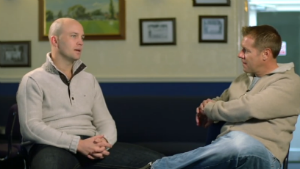Stress, anxiety and burnout are in the news for all the right reasons, and also for all the wrong reasons. In November 2013 the English cricketer Jonathan Trott returned home early from the Ashes series in Australia with what was described officially as a ‘stress-related illness’.
 |
Jonathan Trott in the Sky Sports interview, posted on YouTube
|
Many commentators assumed this was depression. In March this year the batsman gave an interview to Sky Sports in which he said that his withdrawal was due to stress, anxiety and burnout.
This triggered another burst of commentary, with some, perhaps more cynical, commentators criticising him for coming home early from the tour, as if stress, anxiety and burnout is somehow a lesser condition than depression. The suggestion was even made that perhaps the England number three had come home early because he had been unable to cope with the pace of Australian fast bowler Mitchell Johnson.
I watched the interview
Jonathan Trott gave to Sky Sports after they posted it in full on YouTube. The language he used in talking about his symptoms – including feeling confused, not sleeping, not having the mental or emotional energy to hold himself together – is consistent with a diagnosis of stress, anxiety and burnout, with anxiety perhaps being the dominant condition leading to the others.
It is important to underline that stress, anxiety and burnout is not a lesser condition than depression – there is no hierarchy within psychological distress. I could use clinical and technical language to describe what happens when you feel anxious, stressed and close to burnout, but something more visceral is needed. From my own experience of the condition I would describe it as a ‘whispering death’. The anxious thoughts, feelings and sensations whisper in your mind until your confidence and resilience are literally dead.
The famous West Indian fast bowler Michael Holding was nicknamed ‘whispering death’ by umpires because of his silent approach to the wicket as he glided in to deliver some of the fastest bowling ever witnessed. Anxious thoughts can wage a similar war of attrition on our ability to deal with our normal life, whatever that might be. The truth is that the cynics are wrong. Jonathan Trott did not run away from the Ashes tour because the cricket got too tough.
When you are stressed, anxious and close to burnout, things that you can normally do with your eyes closed you simply cannot face or do. For me, when I faced a similar experience in 2006, there was one Sunday when I simply couldn’t face preaching, and I had to ask someone else to step in. I also remember being at my son’s birthday party, which was at a swimming pool, and all I could do was sit in a chair in the café and shiver. I was unable to be part of my eight-year-old son’s celebrations.
It seems that misunderstanding and stigma are still part of the experience of those who suffer from anxiety, as they still are for depression and other mental illness. The theme of Mental Health Awareness Week (MHA Week), last month, was anxiety. One of the things they are looking to encourage is for people to tell their stories, to try and create informed, empathic awareness of this debilitating condition.
The way Jonathan Trott’s story has been misinterpreted in some quarters encouraged me to write about my story again. Anxiety is a complex condition which can have depressive elements, just as depression can include an anxiety component. It can leave you completely unable to function normally. My experience certainly included depressive elements.
According to the Mental Health Foundation (MHF), cases of anxiety are on the rise in the UK, with 8.2 million people diagnosed in 2010. The MHF are using MHA Week to help people understand the many positive ways in which anxiety can be managed and handled.
One of the things I found difficult, until things became very acute, was to talk about it. Once I did, things improved. I also learnt about mindfulness, and this was one of the major factors that took me out of a bad place and put me in a good place. In fact, it has helped me to be in a better place psychologically than I ever was before. This included mindfulness for health that is found in secular psychology as well as the spiritual dimension of it within Christianity.
Cricket is one of my favourite sports and I love watching it. I have always admired Jonathan Trott and seen him as a resilient, tough and reliable batsman for England. Perhaps his most courageous battle will be to return to cricket having faced and overcome the ‘whispering death’ that is anxiety, stress and burnout.